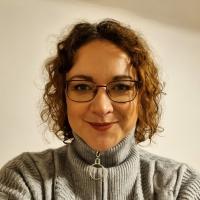Orsolya Zay

Orsolya Zay
Institue of Hungarian Research,
Country
Hungary
Member since
Bio
Archaeologist-historian. Works as a researcher on the written, visual and archaeological sources of Hungarian medieval and Early Modern costume history. A regular speaker at national and international conferences and researcher networks. Processes costume and daliy life topics in experimental archaeological projects, and creates historical costume reconstructions for museums and individuals in Hungary. Participates in national and international archaeological excavations as an archaeologist and as a professional consultant in the processing of historical clothing and history of everyday life in the late medieval and Early Modern period in the Carpathian basin.
Makes lectures at the Institute of Archaeology of Eötvös Loránd University and at the Department of History of Esterházy Károly Catholic University on archaeological, museological and lifestyle history topics.
Makes workshops about historical textile processes and techniques like sprang, tablet weaving, fingerweaving, nalbinding or knitting.
She has been involved in the history of gastronomy since 2011, and since 2014 she has been leading the medieval kitchen of the King Matthias Museum (Hungarian National Museum) at the July event called Palace Games (Visegrádi Palotajátékok), and she organizes a gastronomic program using experimental archaeological methods in the 17th century bakerhouse at the Rákóczi Museum in Sárospatak.
She has been participating in museum pedagogical and museum andragogy developments for 2013 and in the public education program of the Hungarian National Museum (Budapest, HU) and the Dobó István Castle Museum (Eger, HU). In this regard, she is one of the developers of the methodology of living history and historical live interpretation in Hungary.
Makes lectures at the Institute of Archaeology of Eötvös Loránd University and at the Department of History of Esterházy Károly Catholic University on archaeological, museological and lifestyle history topics.
Makes workshops about historical textile processes and techniques like sprang, tablet weaving, fingerweaving, nalbinding or knitting.
She has been involved in the history of gastronomy since 2011, and since 2014 she has been leading the medieval kitchen of the King Matthias Museum (Hungarian National Museum) at the July event called Palace Games (Visegrádi Palotajátékok), and she organizes a gastronomic program using experimental archaeological methods in the 17th century bakerhouse at the Rákóczi Museum in Sárospatak.
She has been participating in museum pedagogical and museum andragogy developments for 2013 and in the public education program of the Hungarian National Museum (Budapest, HU) and the Dobó István Castle Museum (Eger, HU). In this regard, she is one of the developers of the methodology of living history and historical live interpretation in Hungary.





